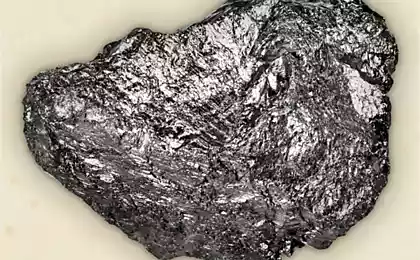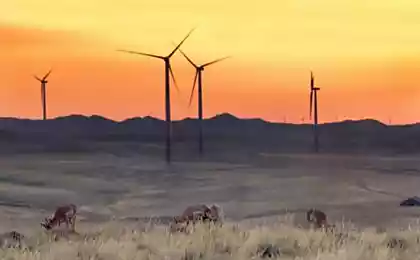459
France, Finland, the UK and Canada will completely abandon coal
In 2023, France could become the first country in the world to completely abandon coal as a fuel for electric power. Followed similar plans announced Finland, Canada and some other countries. Harmful minerals minerals should gradually be replaced by clean alternative energy sources.
Such advanced plans are in sharp contrast with the policy that plans to conduct the newly elected President of the United States Donald trump, does not recognize global climate change in principle.
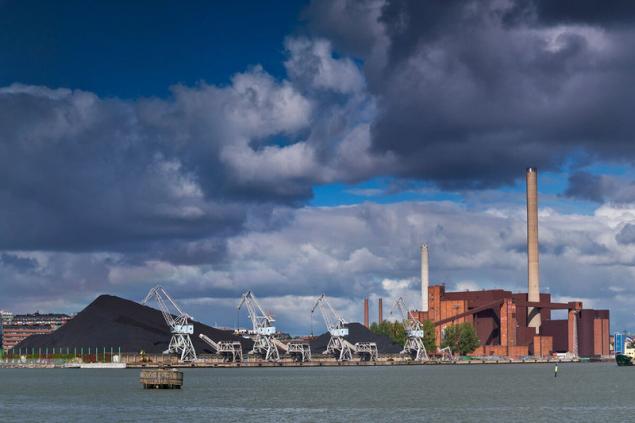
This week on plans for implementation by 2030, ban on burning coal announced Canada. The Minister of environmental protection Catherine McKenna said the country faced a goal to increase the share of renewable energy from the current 80% to 90%.
From Canada to hear such statements more than strange, because this country is ranked fifth in the world in production of energy resources (6% of world production). The world's largest uranium producer, one of the leaders in the production of oil, natural gas and coal. For example, in Alberta the coal you can dig up to 48% of the whole territory of the province, almost in every yard you can dig the coal for the fire. But even albert promises to abandon coal-fired power plants by 2030 (note about stopping the production and export of coal nobody says).
Despite the huge volumes of coal production, Canada's objective is to move to clean energy. From coal refuse completely to reduce greenhouse gas emissions. This is just one of the measures planned in the framework of the big climate programme of the government. To close or transfer to another fuel will have about 22 coal-fired power plants in Canada.
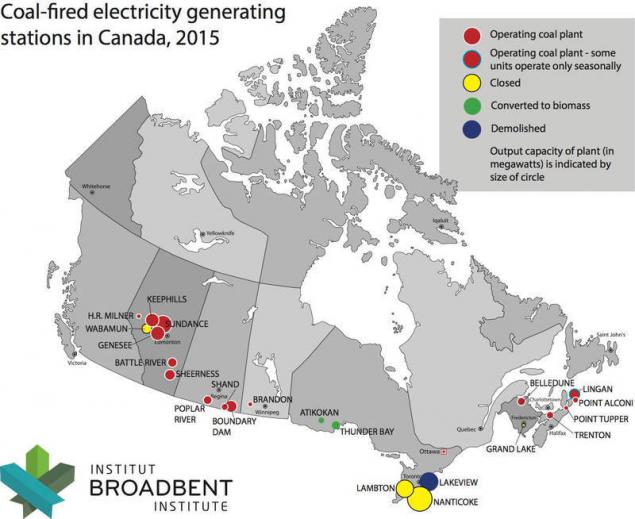
The map operating and closed coal plants in Canada for 2015.
The canadian national plan, however, leaves a loophole for local authorities. Provinces have the right not to close the coal plants entirely, if you find a way to reduce greenhouse gas emissions in another way. For example, introducing the technology of CO2 sequestration into solid minerals.

Associated CO2 obtained in the recent experiment Pacific Northwest national laboratory U.S. Department of energy
"The refusal of generating electricity by burning coal and replace it with a more clean technologies will significantly reduce greenhouse gas emissions, improve the health of Canadians and will serve to generations for many years to come," said Catherine McKenna.

Map of emissions of nitrogen dioxide.
Not less ambitious plans to build Finland. A complete rejection of coal by 2030 is part of the new energy and climate strategy, which is going to represent the government of Finland. It can not be called a sharp bend, because the country previously invested actively in the development of alternative energy, and the share of coal in electricity generation has been declining consistently since 2011. However, the government presented energy strategy must still approve the Parliament of Finland in March 2017.
In addition to Finland and Canada, preliminary plans for the phase-out of coal burning was presented by the France, UK, Netherlands, Austria, Denmark and other countries. All they are going to abandon coal in the next 10-15 years. In the UK now in some days of electric generation from coal plants falls to zero — this was the first time since 1882.
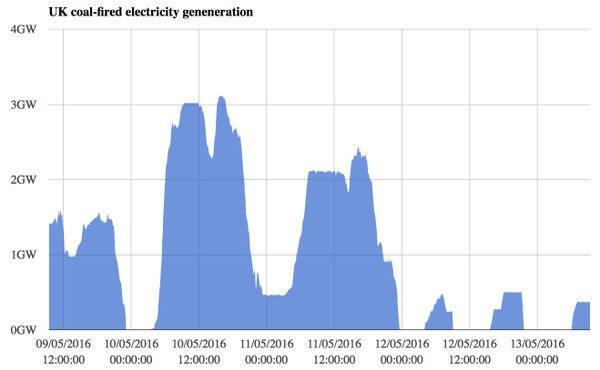
The share of coal in electricity generation in the UK from 9 to 13 may 2016. Source: BM Reports
A bright future? Definitely, the world is changing before our eyes. Previously, developed countries were absolutely indifferent to the unrest in some African country — now they are trying to intervene and restore order. The sooner state was thinking only about economic benefits, and used a type of fuel that is most economically feasible is now at the forefront ecology, calculations on emissions of carbon dioxide and climate modeling the greenhouse effect. People understand that it is better to bring some victims to give up the extra consumption now, but save the planet from ecological disaster.
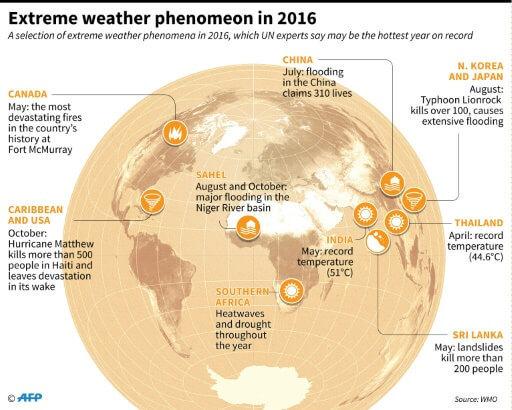
Extreme natural phenomena in 2016, the hottest in the entire history of observations
All this joyful picture darkens only the newly elected President of the United States Donald trump, who said bluntly that he does not believe in global warming. Future American President is looking for ways to get out of the Paris climate agreement — the only real hope for reducing carbon emissions and limiting the pace of warming of the planet.
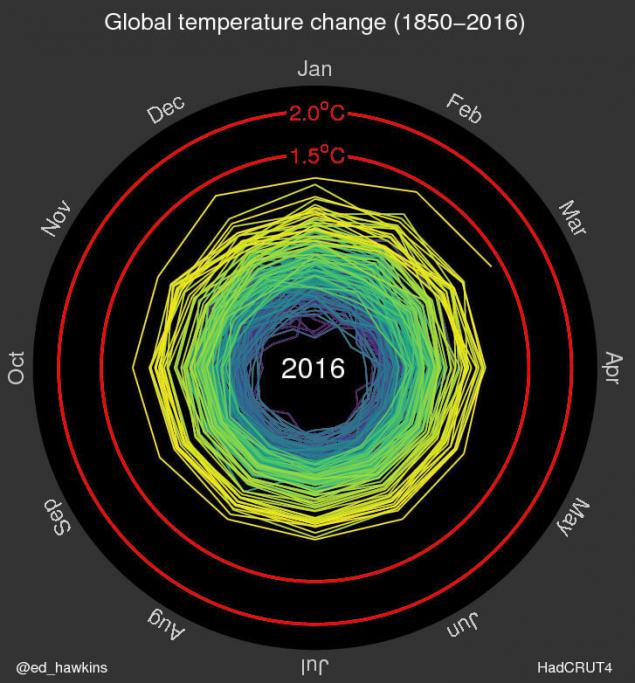
The increase in global average temperature compared to pre-industrial levels. Illustration: Climate Lab Book.
American scientists are very concerned about the prospects in the context of the new "anti-science" public policy. States threatens not only the output of the Paris agreements on climate, but also lower government spending on science: "trump will be the first anti-science President in our history — fears Michael Lubell (Michael Lubell), Director of public Affairs American physical society. — The consequences can be very, very serious."
It is hoped that American science and society will be able to survive this period with minimal losses. published
Source: geektimes.ru/post/283040/
Such advanced plans are in sharp contrast with the policy that plans to conduct the newly elected President of the United States Donald trump, does not recognize global climate change in principle.

This week on plans for implementation by 2030, ban on burning coal announced Canada. The Minister of environmental protection Catherine McKenna said the country faced a goal to increase the share of renewable energy from the current 80% to 90%.
From Canada to hear such statements more than strange, because this country is ranked fifth in the world in production of energy resources (6% of world production). The world's largest uranium producer, one of the leaders in the production of oil, natural gas and coal. For example, in Alberta the coal you can dig up to 48% of the whole territory of the province, almost in every yard you can dig the coal for the fire. But even albert promises to abandon coal-fired power plants by 2030 (note about stopping the production and export of coal nobody says).
Despite the huge volumes of coal production, Canada's objective is to move to clean energy. From coal refuse completely to reduce greenhouse gas emissions. This is just one of the measures planned in the framework of the big climate programme of the government. To close or transfer to another fuel will have about 22 coal-fired power plants in Canada.

The map operating and closed coal plants in Canada for 2015.
The canadian national plan, however, leaves a loophole for local authorities. Provinces have the right not to close the coal plants entirely, if you find a way to reduce greenhouse gas emissions in another way. For example, introducing the technology of CO2 sequestration into solid minerals.

Associated CO2 obtained in the recent experiment Pacific Northwest national laboratory U.S. Department of energy
"The refusal of generating electricity by burning coal and replace it with a more clean technologies will significantly reduce greenhouse gas emissions, improve the health of Canadians and will serve to generations for many years to come," said Catherine McKenna.

Map of emissions of nitrogen dioxide.
Not less ambitious plans to build Finland. A complete rejection of coal by 2030 is part of the new energy and climate strategy, which is going to represent the government of Finland. It can not be called a sharp bend, because the country previously invested actively in the development of alternative energy, and the share of coal in electricity generation has been declining consistently since 2011. However, the government presented energy strategy must still approve the Parliament of Finland in March 2017.
In addition to Finland and Canada, preliminary plans for the phase-out of coal burning was presented by the France, UK, Netherlands, Austria, Denmark and other countries. All they are going to abandon coal in the next 10-15 years. In the UK now in some days of electric generation from coal plants falls to zero — this was the first time since 1882.

The share of coal in electricity generation in the UK from 9 to 13 may 2016. Source: BM Reports
A bright future? Definitely, the world is changing before our eyes. Previously, developed countries were absolutely indifferent to the unrest in some African country — now they are trying to intervene and restore order. The sooner state was thinking only about economic benefits, and used a type of fuel that is most economically feasible is now at the forefront ecology, calculations on emissions of carbon dioxide and climate modeling the greenhouse effect. People understand that it is better to bring some victims to give up the extra consumption now, but save the planet from ecological disaster.

Extreme natural phenomena in 2016, the hottest in the entire history of observations
All this joyful picture darkens only the newly elected President of the United States Donald trump, who said bluntly that he does not believe in global warming. Future American President is looking for ways to get out of the Paris climate agreement — the only real hope for reducing carbon emissions and limiting the pace of warming of the planet.

The increase in global average temperature compared to pre-industrial levels. Illustration: Climate Lab Book.
American scientists are very concerned about the prospects in the context of the new "anti-science" public policy. States threatens not only the output of the Paris agreements on climate, but also lower government spending on science: "trump will be the first anti-science President in our history — fears Michael Lubell (Michael Lubell), Director of public Affairs American physical society. — The consequences can be very, very serious."
It is hoped that American science and society will be able to survive this period with minimal losses. published
Source: geektimes.ru/post/283040/
These 5 natural remedies will help to cope with the manifestations of menopause
Toyota will improve the performance of batteries for electric vehicles
